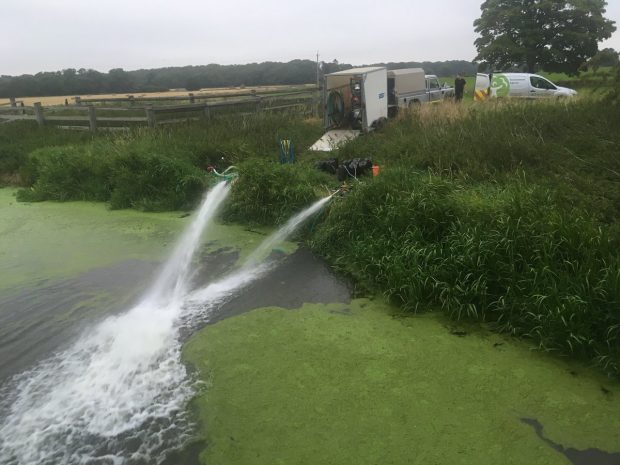
Today, reports of “fish in distress” and fish deaths have featured in the Daily Mail and Daily Express, and continue to be covered in local and regional media. This follows consecutive days of hot weather, reaching temperatures as high as 35 degrees as well as thunderstorms which led to warnings from the Met Office.
Environment Agency staff have been working round the clock to respond to environmental incidents across the country, including reports of fish in distress.
Reports of fish in distress often increase in the summer due to natural processes reducing oxygen levels in the water. Hot, sunny weather can lead to low flows in rivers, and small still waters are particularly susceptible as ponds and lakes start to warm up. This leads to a fall in dissolved oxygen which can be damaging or even fatal to fish. Changes in air pressure found with thunderstorms can make this worse. However, despite the number of recent cases, data for 2020 indicates that there have been a lower number of incidents compared to previous years.
EA teams continue to mitigate the impacts of the recent high temperatures and are carrying out work to reduce conditions that cause fish to be in distress. These fish rescue operations, which save thousands of fish, include using aeration equipment or hydrogen peroxide to restore dissolved oxygen levels, clearing pollution, or in some cases relocating fish when it is possible to do so.
We also continue to adapt to climate change, as such, a number of projects have been launched by the Environment Agency to improve the resilience of our fish stocks and develop greener technology. This includes the introduction of solar paneled aerators to improve oxygen levels in the water at the Haverhill Newt Pond and Washlands Haverhill in Suffolk.
Dr Graeme Storey, Fisheries Manager at the Environment Agency, said:
Our teams work round the clock to respond to environmental incidents, including reports of fish in distress which often increase during the summer months.
Each year, we carry out many fish rescue operations, saving thousands of fish by using aeration equipment or hydrogen peroxide to restore oxygen levels. We also provide angling clubs and councils with free advice on how to manage their waters effectively.
Anyone who sees fish in distress should contact us on 0800 80 70 60.
Fish should never be moved to other waters by the public as although well intentioned, they are unlikely to survive and could spread disease or invasive species by accident, which can damage fish and other wildlife in the area. If you see fish in distress, please report them to our hotline on 0800 80 70 60.
Anyone who sees fish in distress should contact us on 0800 80 70 60.
2 comments
Comment by Michael Heylin OBE posted on
Fisheries Officers, NCOs lead by a broken team, thanks to Defra and this government. What's the matter couldn't you find another cut in finances to impose of them today so you sell them the feel good factor having spent the last ten years cutting its throat to starve it of oxygen?
Comment by Holly Whitelaw posted on
We have got to bad the poisoning of our soils and waterways with artificial fertilisers and other toxins. This is not a natural process.